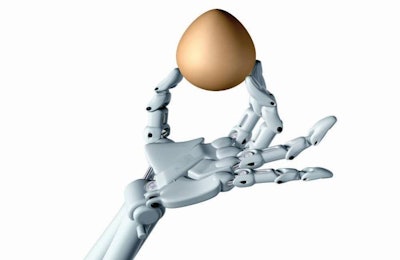
Last week I had the good fortune of visiting a broiler farm in Catalonia (Spain) that works with a robot. I will publish an article with more details about it later, but for now,I'll admit that I was surprised. Robotics is not only about doing jobs to replace human beings, but about doing jobs that human beings do not do, such as collecting data for precision poultry production.
We hear about the Cloud, big data, GPS, sensors that detect moisture, CO2, ammonia and movements. Not in the car we drive, but in poultry farms.
When would we have thought that these technologies would be used in the poultry industry? I recently read an article in the Spanish newspaper El País about dairy farms automatized with robots and the author commented that "farms, facilities frequently associated with traditionalism and also far from cutting-edge technology, seem to be moving towards automation and data analysis." He mentioned that the farm he visited, still works with the same number of employees as before, but its owners work less. But they did invest more money, for sure.
The images that we now have, perhaps a bit bucolic, will be left behind. I get the impression that the improvement of efficiency will no longer come in large proportions from genetics and nutrition. Do you know that nanotechnology is also going to be applied in the poultry industry? For example, the use of nanotubes to catch the tiny avian influenza viruses, that is, for an early diagnosis and for isolations.
But things do not stop there. In favor of the new ethics of animal welfare and environmental awareness, comes the use of the cell as a factory for the production of lab "meat" or leather to manufacture shoes.
I wonder if we will apply this in Latin America. I believe that in the end we will, to remain efficient, and therefore, competitive. What do you think?
















